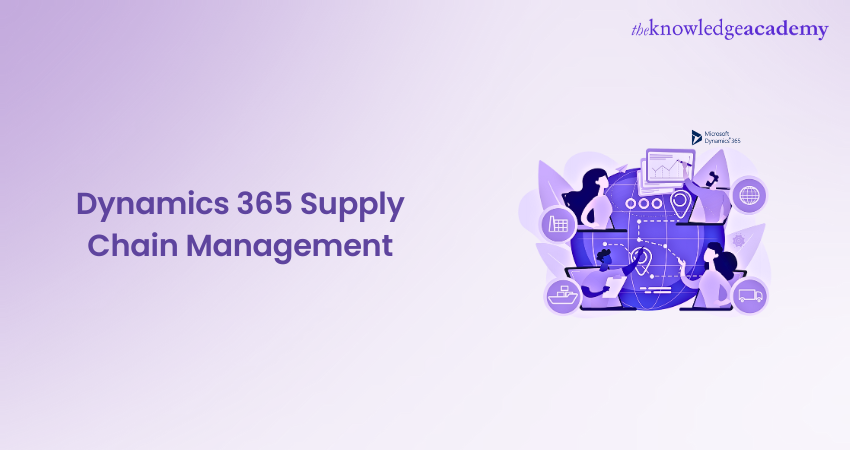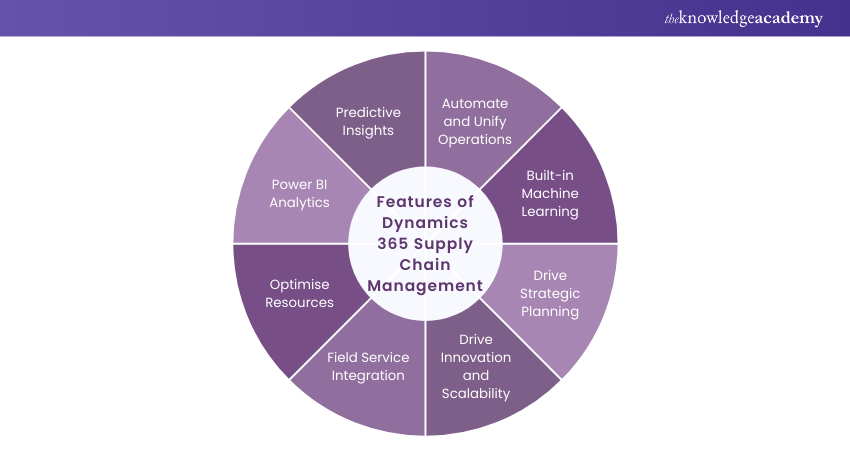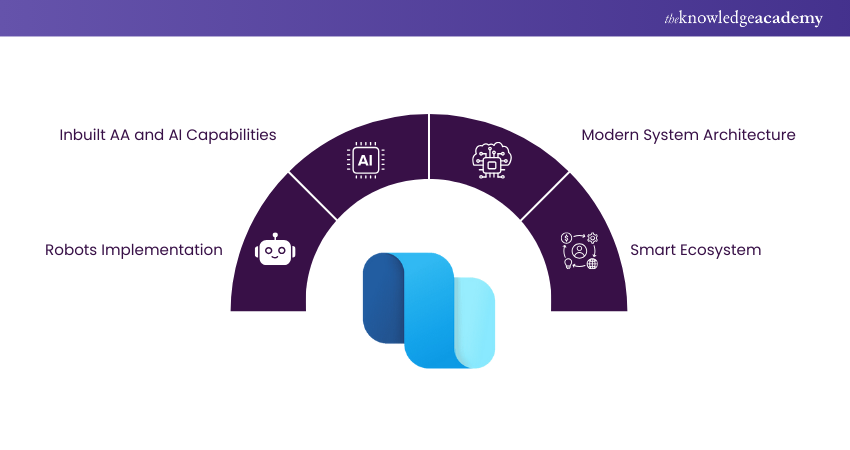We may not have the course you’re looking for. If you enquire or give us a call on +0800 780004 and speak to our training experts, we may still be able to help with your training requirements.
Training Outcomes Within Your Budget!
We ensure quality, budget-alignment, and timely delivery by our expert instructors.

What does Dynamics 365 Supply Chain Management refer to? It is an online system created to improve and make Supply Chain processes more efficient. The system combines important aspects including planning, production, inventory, and logistics. This ensures better visibility, efficiency, and agility throughout the complete Supply Chain. Businesses can utilise real-time insights to make decisions based on data, which can lead to lower operational costs and higher customer satisfaction.
Dynamics 365 Supply Chain Management also has predictive analytics capabilities to forecast demand shifts. It aids businesses in promptly addressing market changes, preventing delays and interruptions. The system can be customised to meet the specific requirements of various industries, giving a competitive advantage. Read further to explore Dynamics 365 Supply Chain Management.
Table of Contents
1) What is Dynamics 365 Supply Chain Management?
2) What are the Modules of Dynamics 365 Supply Chain Management?
3) What are the Features of Dynamics 365 Supply Chain Management?
4) What are the Advantages of Dynamics 365 Supply Chain Management?
5) Future Scope of Supply Chain Management
5) Conclusion
What is Dynamics 365 Supply Chain Management?
Dynamics 365 Supply Chain Management is Microsoft's enterprise-scale Supply Chain solution. The solution enables operation leaders in organisations to streamline, simplify and manage manufacturing and Supply Chain processes. The Supply Chain Management solution offers AI and IoT features, enabling operations leaders to optimise planning, inventory, and production. It also enhances warehousing and transportation efficiency. This is where an enterprise-scale solution like Microsoft’s Dynamics 365 comes in handy for an organisation.
The Supply Chain Management (SCM) solution helps organisations streamline and accelerate their Supply Chain practices to produce more and scale their operations. Obtain a cohesive perspective of your Supply Chain, including inventory and logistics, by utilising predictive data to make quick and strategic decisions. Besides improving the organisation's operational efficiency, the Supply Chain Management features enhance profitability and product quality.
What are the Modules of Dynamics 365 Supply Chain Management?
The modules of the Supply Chain Management solution help to simplify tasks and increase profits through better resource management in the Supply Chain. . Some of the modules are described as follows:
a) Asset Management: The SCM solution effectively manages all the assets, regardless of the purpose such as operating, maintaining, selling, and developing. It also allows the organisation to track and record all the products precisely without errors.
b) Warehouse Management: Warehouse Management in Dynamics 365 lets the organisation oversee and supervise all operations related to the warehouse. The solution integrates with other departments such as sales, manufacturing, transportation, quality control, transfer, purchase and returns. This simplifies and connects all the departments in the organisation for better flow.
c) Product Information Management (PIM): Product Data Management (PDM) involves capturing, storing, organising, and managing all product-related information throughout its lifecycle. From design specifications to marketing materials and customer feedback, PDM ensures seamless coordination across an organisation. By maintaining a shared product definition, businesses can optimise processes and automate tasks, ultimately enhancing efficiency and supporting growth.
Simplify your tasks with Business Rules in Dynamics 365! Discover how to set effective rules and enhance your business flow. Learn now!
d) Transportation Management: The SCM solution manages all the transportation communications with the help of accurate data tracking. This solution module supervises all transport-related transactions, irrespective of whether they are moving out or coming into the organisation.
e) Inventory Management: This is a practical module of the Dynamics 365 solution that offers efficient inventory management to all organisations, regardless of size. This solution module collects and records the inventory and helps organisations eradicate restrictions on shipment by providing real-time insights.
f) Rebate Management: This helps organisations create contracts and agreements with the end customers to validate and legalise the transaction. This allows businesses to calculate each deal's rebates, deductions, and royalties more efficiently. This module also centralises all the data so that an organisation can create, review and process all transactions more effectively and efficiently.
The SCM solution consists of important modules such as Master Planning, Inventory Visibility, Service Management, Sales, Marketing, Production Control, and Procurement.
Unlock your Supply Chain potential with our expert-led Dynamics 365 Supply Chain Management – Functional Consultant MB330 Course today!
What are the Features of Dynamics 365 Supply Chain Management?

The Supply Chain Management solution includes several features that enhance the effectiveness of the Dynamic 365 Supply Chain Management tool. The following are the features of the Dynamic 365 Supply Chain Management:
a) Automate and Unify Operations: The SCM solution helps achieve automation in your Supply Chain pipeline to accelerate processes while reducing redundant tasks. It helps streamline and simplify operations with a unified inventory, logistics, manufacturing, and warehousing data view.
b) Built-in Machine Learning: The SCM solution’s integrated machine learning (ML) provides continuous insights to effectively manage and handle inventory. The effective management of raw materials and finished goods is yet another advantage of the SCM solution. The automation capabilities help businesses automate all manufacturing processes while also helping optimise warehouse use and scale warehouse management.
c) Drive Strategic Planning: Utilise SCM insights to transform Supply Chain data into predictive analytics, enabling informed decisions and strategic planning for improved outcomes.
Unlock your potential with exciting Dynamics 365 jobs! Start your journey today and elevate your career to new heights!
d) Drive Innovation and Scalability : The SCM solution helps maximise operational efficiency, optimise workforce productivity and drive scalability. The solution achieves transparency in your Supply Chain cycle, right from ordering, warehousing and forecasting to inventory management and automation.
e) Field Service Integration: The Dynamics 365 Field Service has a built-in capability, making it easy to automate the resource management process. It also helps make the tracking and management of the workforce more convenient.
f) Optimise Resources: The SCM solution helps track inventory levels, improve cost management, predict customer demand, and achieve better resource and inventory planning. This helps drive productive growth while also reducing downtime and eliminating any redundancies.
g) Power BI Analytics: The SCM solution, with embedded Power BI analytics, enables organisations to speed up inbound and outbound processes. The solution supplies real-time intelligence about warehouses and offers end-to-end inventory and shipping visibility.
h) Predictive Insights: The SCM solution's predictive insights allow organisations to identify potential equipment issues before breakdowns. The solution helps prevent downtime and costly maintenance costs.
Kickstart your career with our Microsoft Dynamics 365 Business Central Functional Consultant MB800 Course – Sign up now!
What are the Advantages of Dynamics 365 Supply Chain Management?
The Supply Chain Management solution offers several advantages to an organisation, a few of which we will briefly discuss. Dynamics 365 helps an organisation:
a) Accelerate Time to Market: The SCM solution speeds up time-to-market, streamlines order management, and improves product quality, enhancing customer satisfaction.
b) Intelligent Manufacturing Operations: Dynamics 365 improves manufacturing flexibility and expandability, decreases mistakes, and ensures uninterrupted operation, even in distant areas. Implementing the Dynamics Supply Chain module embedded with AI, IoT, and Mixed Reality makes it possible.
c) Demand Analysis and Fulfillment: Dynamics 365 helps companies organise and manage their financial records using a general ledger. The solution enables you to manage your accounts payable, accounts receivable, tax management, and more.
d) Increase Asset Uptime: Dynamics 365 automates resource scheduling, and slows machine downtime. It also manages Supply Chain operations with predictive maintenance and improved equipment effectiveness.
e) Optimises Inventory and Logistics: The SCM solution helps an organisation drive omnichannel inventory with real-time access and helps easily automate your logistics and warehousing processes. It simplifies procurement management and provides accurate cost predictions. Seamless integration with Dynamics 365 Business Central Warehouse Management enhances these capabilities.
Master the art of sales with our Microsoft Dynamics 365 Sales MB210 Course – Start today!
Future Scope of Supply Chain
The Supply Chain landscape has undergone rapid transformation to meet modern business demands. The recent pandemic disrupted industries, compelling them to adapt swiftly. Since 2022, businesses have worked towards recovery, but significant changes persist. Let’s examine the key trends shaping the future of Supply Chain Management:

1) Robotics Implementation:
Labor demand is surging, leading to higher wages. In response, businesses are turning to cyber-physical systems and smart robots across manufacturing, warehousing, and distribution.
These robotic solutions enhance efficiency and address resource constraints.
2) Inbuilt AI and Advanced Analytics:
AI and advanced analytics empower quick, accurate decision-making. Tools like D365 Supply Chain Management embed these capabilities, driving performance improvements.
Real-time insights enable proactive supply chain management.
3) Modern System Architecture:
Supply chain operations are increasingly complex and unpredictable. To adapt, organisations must embrace flexible, agile architectures.
Microservices-based applications enhance scalability and responsiveness.
4) Smart Ecosystems:
Seamless communication and real-time data sharing are essential for effective Supply Chain Management.
Integrated ecosystems facilitate collaboration among users, ensuring a connected system.
In brief, leveraging technology and staying agile will be critical for Supply Chains to thrive in the digital era.
Conclusion
Dynamics 365 Supply Chain Management revolutionises the way companies manage supply chain operations. It increases effectiveness, flexibility, and transparency throughout operations. By providing real-time insights, advanced analytics, and AI technology, it enables quicker responses and informed decisions based on data. As companies change, Dynamics 365 changes as well, promoting ongoing enhancements and creativity. It is an asset for remaining competitive in a quickly evolving market.
Kickstart your CRM career with our Microsoft Dynamics 365 Fundamentals (CRM) MB-910 Course – Register now!
Frequently Asked Questions

Both Dynamics 365 and SAP are ERP solutions, but they vary in their approach. Dynamics 365 is perfectly suited for mid-sized businesses because of its flexibility, integration with Microsoft tools, and user-friendly features. SAP is strong and favored by big corporations with intricate requirements.

Azure and Dynamics 365 have distinct functions. Azure is a cloud platform that provides infrastructure, computing, and AI services. Dynamics 365 is a collection of business applications developed on Azure with a focus on CRM and ERP solutions. Their merger improves the company's success.

The Knowledge Academy takes global learning to new heights, offering over 30,000 online courses across 490+ locations in 220 countries. This expansive reach ensures accessibility and convenience for learners worldwide.
Alongside our diverse Online Course Catalogue, encompassing 19 major categories, we go the extra mile by providing a plethora of free educational Online Resources like News updates, Blogs, videos, webinars, and interview questions. Tailoring learning experiences further, professionals can maximise value with customisable Course Bundles of TKA.

The Knowledge Academy’s Knowledge Pass, a prepaid voucher, adds another layer of flexibility, allowing course bookings over a 12-month period. Join us on a journey where education knows no bounds.

The Knowledge Academy offers various Microsoft Dynamics 365 Training, including the Microsoft Dynamics 365 Fundamentals (CRM) MB910 Course, Microsoft Dynamics 365 Sales MB210 Course, and Microsoft Dynamics 365 Fundamentals (ERP) MB920 Course. These courses cater to different skill levels, providing comprehensive insights into Dynamics 365 Business Process Flow.
Our Microsoft Technical Blogs cover a range of topics related to Supply Chain Management, offering valuable resources, best practices, and industry insights. Whether you are a beginner or looking to advance your Microsoft Technical skills, The Knowledge Academy's diverse courses and informative blogs have got you covered.
Upcoming Business Skills Resources Batches & Dates
Date
 Microsoft Dynamics 365 Fundamentals (CRM) MB910
Microsoft Dynamics 365 Fundamentals (CRM) MB910
Thu 1st Jan 1970







 Top Rated Course
Top Rated Course



 If you wish to make any changes to your course, please
If you wish to make any changes to your course, please


